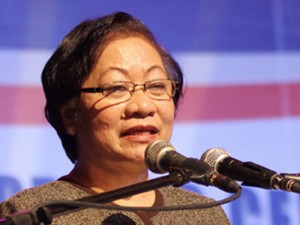To give Filipinos who left the country illegally to work abroad a chance to return home to see their children graduate in March, Labor Secretary Rosalinda Baldoz said Monday the government would review its policy barring them from legalizing their status.
Baldoz said she would have the Philippine Overseas Employment Administration (POEA) and the Overseas Workers Welfare Administration (Owwa) review the policy that was initiated by former labor secretary and now Supreme Court Associate Justice Arturo Brion.
“I’m thinking about convening a joint POEA and Owwa board meeting to review this department order issued during the time of Secretary Brion which disallows irregular or un-
documented workers from becoming regular or documented workers,” Baldoz said in an interview.
She said the review would be “in the spirit” of the bilateral agreements Manila signed recently with Jordan and Lebanon on the protection of OFWs’ rights while normalizing labor relations with the two countries.
“Rest assured that I and (Labor) Undersecretary (Danilo) Cruz will work on this immediately and present it to the POEA and Owwa boards,” Baldoz said.
The labor chief made the statement after Filipino community leaders in Beirut asked Baldoz to give undocumented OFWs there—those who entered Lebanon after the total deployment ban there was imposed by the Philippine government in 2007—a chance to come home to attend their children’s graduation.
“Most of the OFWs here are very eager to go home and see their children graduate. Our main concern is that our undocumented compatriots would at least be given passes to allow them to visit their families and return here,” said Gerald Cabauatan, a Filipino community leader in Beirut.
Cabauatan said he and other OFWs who arrived in Lebanon before the total deployment ban was imposed on June 18, 2007, were given passes that allowed them to return after vacationing at in the Philippines.
However, those who arrived after the ban was imposed fear that they would not be able to return to Lebanon if they leave for the Philippines.
“This will be studied by the POEA governing board to see if the time has come to change this policy so that those who have not been home for the longest time would not have a hard time visiting (the country),” said Undersecretary Cruz.
Cabauatan said there were an estimated 35,000 OFWs in Lebanon when the total deployment ban was imposed but that number has increased to around 50,000 with the continued influx of undocumented OFWs.
